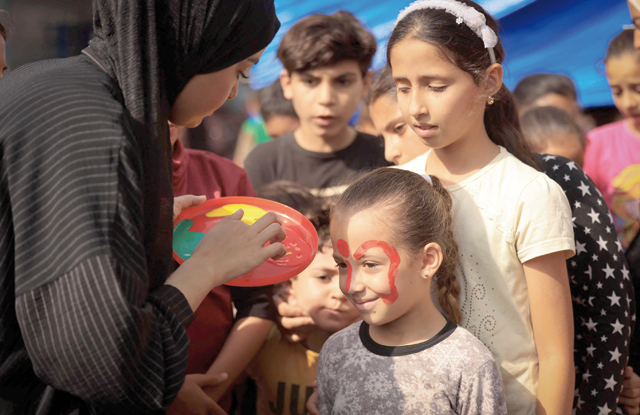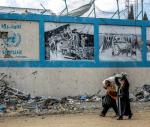You are here
Experts raise awareness on guiding children through discussions about Gaza conflict
By Maria Weldali - Oct 23,2023 - Last updated at Oct 23,2023

A Palestinian child who have fled her home due to Israeli strikes, has her face painted during games organised by humanitarian workers families they shelter at a United Nations run school, in Khan Yunis, in the southern Gaza Strip, on Monday (AFP photo)
AMMAN — Amid the escalating situation in Gaza, family specialists are raising awareness about strategies for discussing the conflict with children.
Shaima Awad, a family life coach, emphasised, “Simplifying the explanation and allowing the child space to express themselves are essential for fostering honest conversations about conflict and war.”
According to Awad, ignoring or avoiding the topic, especially if the child is interested in learning about it, is not recommended.
She pointed out that it is crucial to give an age-appropriate explanation about the current situation in the Gaza Strip or even about any other conflict happening elsewhere.
Oftentimes, children want to help and positively contribute. Giving them appropriate ways to participate and feel they have made a positive change is the right approach, she explained.
“Currently there are various organisations accepting donations to help the people and children of Gaza here in Jordan... Parents can consider going with their kids to donate,” Awad said.
In a statement made available to The Jordan Times, Save the Children Jordan wrote that the current difficult circumstances saddens and upsets people.
Due to the fact that children take “emotional cues” from adults surrounding them, the organisation underlined the need to talk with children about war using certain tips.
According to the foundation, “it is important to make time and listen when your child wants to talk, to validate their feelings and reassure them that all adults are seeking to resolve the current situation”.
Rand Khushman, a Jordanian psychiatrist, told The Jordan Times, “In times of crises, images of violence and bombing dominate news outlets and media platforms. With children’s increasing access to media it has become, in most cases, challenging to shield them from misleading or even frightening news.”
Khushman noted that children often have certain questions relating to the videos or pictures they come across if they see their parents grieving or even crying.
Talking to a child who might not understand what is going on is not an easy thing, however, kids should not be confused. Rather, children should feel reassured and calm, Khushman said.
“The most important thing is to keep the lines of communication open with your kids,” Khushman concluded.
Related Articles
AMMAN — The Lower House’s recent decision to endorse penalty for suicidal people has drawn criticism from experts.“Those who attempt suicide
AMMAN — Companies in Jordan can help increase their employees’ productivity, reduce employee turnover, improve gender diversity and support
AMMAN — Eliminating child labour requires a comprehensive approach that addresses its root causes by tackling poverty and increasing childre

















